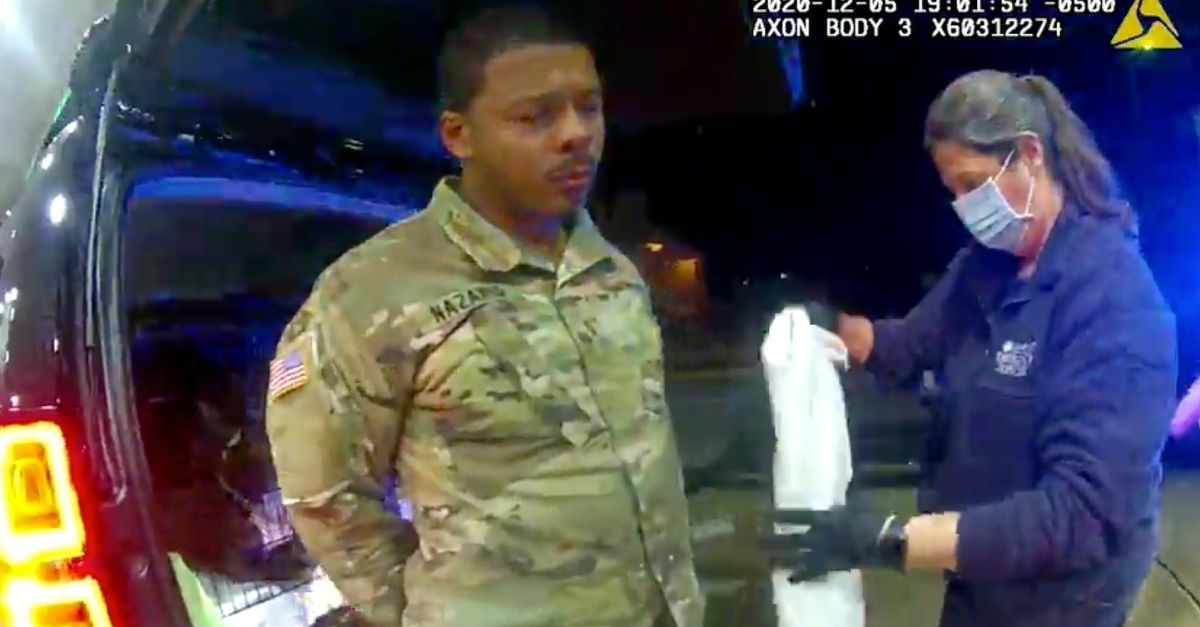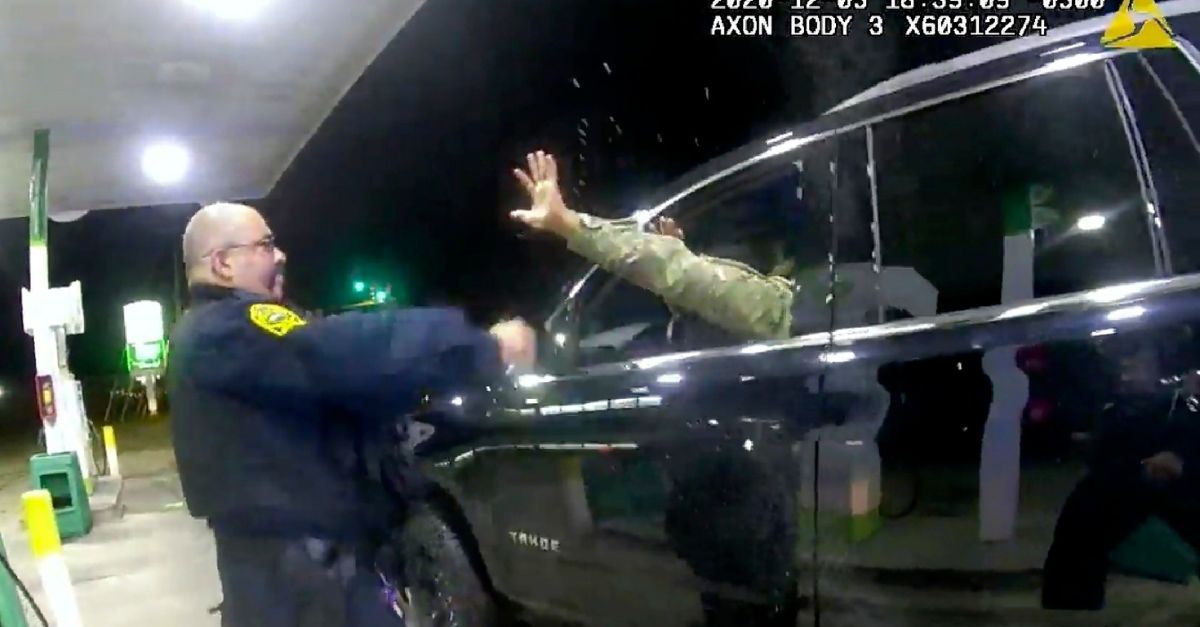
In this image from Windsor, Va., police body camera footage, U.S. Army Lt. Caron Nazario is helped by an EMT after he was pepper-sprayed by Windsor police during a traffic stop on Dec. 20, 2020. (Windsor Police Department via AP File)
A U.S. Army soldier who sued police after being pepper-sprayed, beaten and threatened with firearms during a traffic stop in a rural southern Virginia town — all without being arrested — wants a new trial, according to a filing in a federal appeals court.
Caron Nazario, a 2nd Army Lieutenant, says that a relatively minuscule jury award in a lawsuit over alleged police misconduct was the result of trial court rulings that Nazario says had an outsize impact on his case. In January, a jury awarded Nazario, who had sued over a December 2020 traffic stop by Windsor police officers Daniel Crocker and Joe Gutierrez that turned violent, nearly $4,000 in compensatory and punitive damages — a fraction of the $1 million he initially sought. A jury had mostly sided with police in the case, agreeing that the officers did not batter Nazario, nor falsely imprison him nor conduct an illegal search of his vehicle.
In an appeal filed Monday, Nazario asks the Fourth U.S. Circuit Court of Appeals to find that the lower court mistakenly ruled that the officers had probable cause to believe he was evading them and not, as he says, merely trying to accommodate them while minding his own safety and well-being. He also wants the court to address whether he did in fact obstruct justice and fail to obey orders. Nazario also argues that the district court mistakenly dismissed his claims of unreasonable seizure and excessive force.
At trial, attorneys for police argued that Nazario was threatening them during the stop, describing the matter as a “tense, uncertain and rapidly-evolving situation.” Nazario’s attorney Jonathan Arthur argued against this point in the appellate brief.
“To the extent this matter was ‘tense, uncertain, and rapidly evolving,’ it had nothing to do with Lt. Nazario’s behavior, rather the conduct of Crocker and Gutierrez. This is not the sort of police conduct … [qualified immunity] was designed to protect,” Arthur wrote. “It was not a bad guess in a grey area in a tense, uncertain or rapidly evolving situation. Lt. Nazario was calm and compliant, the officers, however, were not.”
Nazario’s immediate failure to pull over while driving in uniform also should not have led the court to find he was “threatening” simply because he might have been armed while on- or off-duty, his lawyer argues.
“The District Court … argued that Lt. Nazario being in uniform but not presenting a firearm in combination with his eluding also may have led an officer to reasonably believe he was armed and dangerous. However, being armed is a constitutional right and it does not alone support a reasonable conclusion that Lt. Nazario was a danger to justify the use of force,” the appeal states.
Nazario’s decision to stay in his vehicle out of fear for his life was justified too because even under the conditions of a lawful arrest, a citizen still has the right to reasonably resist unreasonable force, Arthur argued.
“There was nothing in [his] reaction to the officers’ behavior that was furtive or menacing,” the filing says. “Lt. Nazario kept his hands visible, spoke calmly, and all he asked for was a simple explanation.”
Several rulings spanning 2009 to 2011 have denied qualified immunity in instances where officers tased people who refused to leave their car in a traffic stop, the appeal notes.
On the force count, Nazario’s attorney writes that under the correct probable cause analysis, the only other offense police had to believe Nazario was guilty of committing was failure to display his license plate.
“This is not a crime at all, but a traffic offense, that is so minor a judge can dismiss the summons upon proof of compliance,” Arthur argued.
At the end of the brief, Arthur contends the district court’s decision opened the door for officers to “circumvent liability for prolonged unreasonable traffic stops” and if the lower court’s decision stands, it will invite police to continue to come up with “novel and unadjudicated ways” to arrest people for unreasonable prolonged periods, even if they are just “playing Sudoku, dancing in the streets, telling jokes to bystanders, or going to Walmart.”
Nazario was off-duty and wearing his uniform while driving his newly purchased Tahoe SUV in December 2020 when Crocker and Gutierrez pulled him over because the car did not have its rear license plate displayed.
What followed, according to Nazario’s April 2021 lawsuit, was an example of overt racial profiling, excessive force and a violation of his First Amendment rights by overzealous police officers in a town already plagued with patterns of discriminatory policing.
Read Related Also: Marines and Navy investigating alleged TikTok confession where man identified as a sergeant says he helped two coworkers bury a ‘random’ dead ‘biker’ at Camp Lejeune
Footage captured by police body cameras showed Crocker and Gutierrez exiting their squad car once Nazario stopped. Unholstering their firearms immediately before aiming them at the Tahoe, Nazario was told to show his hands. He complied, but not before he started recording the interaction with police on his phone. At trial, both his footage and footage from the police cameras were used at length.
The 2nd Army lieutenant then asked the officers why he was being stopped, according to court records. He told them he would not exit the vehicle as he asked “what is going on?”
“I’m serving this country and this is how I’m treated?” Nazario could be heard saying in the body camera footage, according to CNN.
Gutierrez, with his gun drawn in one hand, reached for his stun gun with the other. It was at this exact moment that Gutierrez told Nazario he was “fixin’ to ride the lightning.”

In this image taken from a Windsor, Va., Police video, a police officer uses a spray agent U.S. Army Lt. Caron Nazario, Dec. 20, 2020, in Windsor, Va. (Windsor Police Department via AP, File)
As Nazario told the officer he was scared and asked again what he had done to be pulled over, Gutierrez is heard on camera telling him that he “should be” scared and that he was being stopped for a traffic violation. While Nazario’s hands were lifted above the steering wheel while remaining inside the vehicle, Gutierrez went on to douse him with pepper spray at least four times in his face, according to the soldier. His dog, crated in the backseat, also began to choke on the spray, Nazario said.
Wrestled out of his car, he was thrown to the ground after being hit on the knees repeatedly. He was handcuffed and interrogated, though never placed under arrest.
During the exchange, Nazario said temporary tags were displayed in the upper right hand interior corner of the rear window, something police were heard acknowledging in body camera footage of the interaction.
His vehicle windows were heavily tinted and, according to police reports obtained by CNN when Nazario first filed the lawsuit, Crocker recorded Nazario as “disregard[ing]” lights and sirens and said that police were unable to see inside his car because of the tint. Police also recorded that Nazario only kept driving at a low rate of speed for one minute and 40 seconds after officers flipped on their lights and sirens.
Nazario said that he had slowed his car down until he could reach a nearby gas station less than a mile from where he was. It was more well-lit, and Nazario said he felt safer.
Nazario argued at trial that Gutierrez’s “fixin’ to ride the lightning” comment was meant as a threat that the soldier would be executed, since the phrase is commonly known as a reference to death by electric chair. Lawyers representing the officer said Gutierrez was referring to his stun gun and that the statement was not meant to threaten Nazario or imply that the officers intended to kill him.
Crocker is still a member of the force. Gutierrez was ultimately fired in April 2021 after the incident went viral amid national conversations about police brutality and systemic racial injustice following the murder of George Floyd while in police custody in Minneapolis.
Virginia Attorney General Jason Miyares reached a settlement with the town of Windsor last month to conduct an independent review of allegations of misconduct by members of the Windsor Police Department, according to the Associated Press. There will also be training initiatives to address these problems.
Miyares noted that while Windsor’s population is only 22% Black, Black people accounted for 42% of the department’s traffic stops from July 2020 to September 2021.
Have a tip we should know? [email protected]






